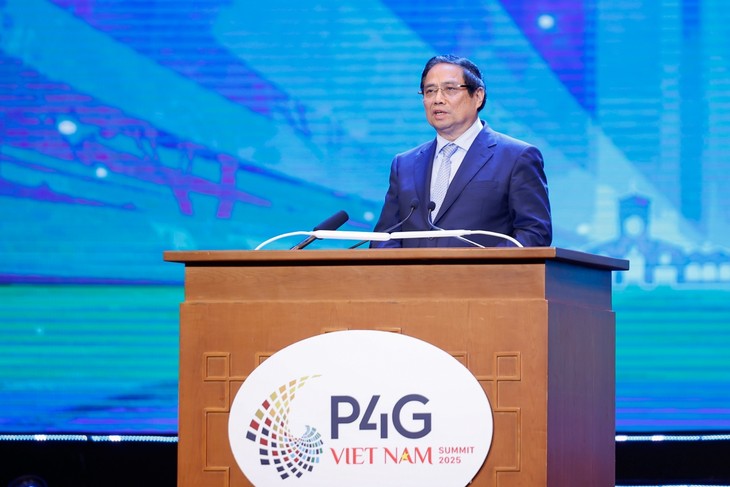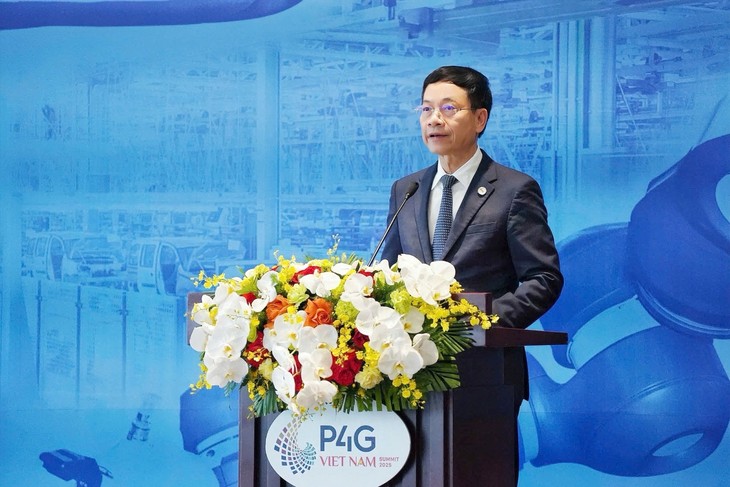(VOVWORLD) - Vietnam is promoting green transition, recognizing it as a key, objective requirement and a breakthrough to drive rapid, sustainable growth in addition to digital transformation. Its Green Economic Development Strategy focuses on promoting green thinking, building a responsible green community, and strengthening international cooperation through multi-party green partnerships.
 Vietnamese Prime Minister Pham Minh Chinh speaks at the P4G summit in Hanoi. (Photo: VGP/Nhat Bac) Vietnamese Prime Minister Pham Minh Chinh speaks at the P4G summit in Hanoi. (Photo: VGP/Nhat Bac) |
Embracing the principle of not sacrificing social progress and the environment to pursue economic growth, Vietnam aims to achieve prosperity while ensuring environmental sustainability and social equity, toward a green, carbon-neutral economy that helps limit global temperature rise.
Vietnamese Prime Minister Pham Minh Chinh addressed the just-concluded Partnership for Green Growth and the Global Goals 2030 (P4G) Summit in Hanoi, saying that Vietnam identifies green transition as a key factor in speeding up sustainable development.
“A green economy requires green businesses. A green society needs green citizens. A green world depends on green nations. Participating in, contributing to, and benefiting from the green transition is the responsibility of, and in the interest of, all countries and peoples, jointly pursuing the spirit of ‘working together, winning together, sharing together, and developing together’,” said Mr Chinh.
Vietnam is taking comprehensive measures to honor its commitment of net-zero emissions by 2050. A roadmap has been promulgated to implement the National Power Development Plan 8, the Hydrogen Energy Development Strategy to 2030, the One Million Hectares of High-Quality, Low-Emission Rice Project, and a set of Green Growth Statistical Indicators.
Vietnam is also refining its policies on environmental protection and the management, exploitation, and use of natural resources, such as the Land Law and the Water Resources Law. Vietnam is developing markets for land use rights, resource exploitation rights, and carbon credits in order to integrate into the global green economy.
According to Minister of Science and Technology Nguyen Manh Hung, Vietnam is one of the first countries to develop a national action plan to implement the 2030 agenda, shifting from a traditional growth model to the one based on green growth and a digital economy. “These strong commitments are intentionally placing pressure on Vietnam to unlock its innovation and seek global solutions to solve its green development challenges,” said Hung.
 Minister of Science and Technology Nguyen Manh Hung speaks at the discussion on breakthrough technologies for green transition and sustainable development in the smart age. (Photo: VGP) Minister of Science and Technology Nguyen Manh Hung speaks at the discussion on breakthrough technologies for green transition and sustainable development in the smart age. (Photo: VGP) |
Solution groups are being set up to unlock resources for climate change response. Among them are 16 sustainable development projects in the Mekong Delta, with a total loan of 2.5 billion USD. The Government and relevant agencies are helping businesses transform their production to meet new green standards in carbon emission and environmental-social-governance (ESG) criteria.
Vietnam has announced a resource mobilization plan to implement the Political Declaration on establishing the Just Energy Transition Partnership (JETP), and has identified key projects under the framework of the Asia Zero Emissions Community (AZEC) initiative.
The readiness of the Vietnamese business community for green transformation is steadily increasing, with more and more green manufacturing and processing models, green buildings, green ports, eco-industrial parks, and sustainable building materials.
The public-private partnership (PPP) model promotes sustainable green growth in Vietnam. Nguyen Do Anh Tuan, Director of the International Cooperation Department at the Ministry of Agriculture and Environment, said the partnership generates greater profits for Vietnamese agriculture. “This will be a fundamental trend for Vietnamese agriculture because innovation must begin with diverse, fresh ideas which can connect and coordinate the public and private sectors. To achieve the Government's growth target of 4% for agriculture, innovation is the key,” said Tuan.